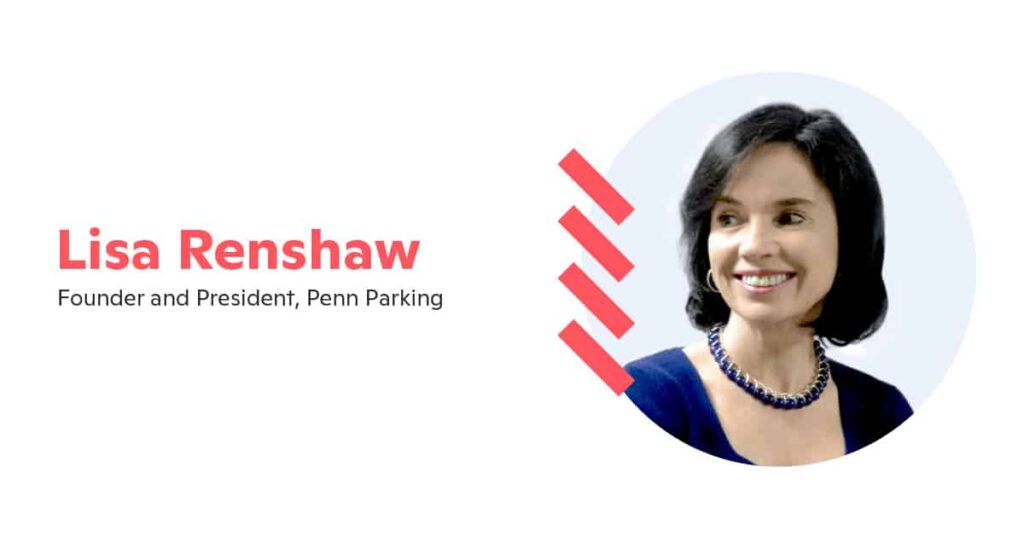Historically, mobility, smart cities, and parking have been male-dominated industries, but as these industries evolve, women are playing a significant role in the future of these industries. Only one-third of entry-level hires are women, and five male C-suites exist for every female in infrastructure. However, you can bet that things are changing. It’s time we shine a light on the impact that women are making and empower them to excel in an industry that acutely affects how we live.
We spoke to Lisa Renshaw of Penn Parking as part of our Women in Infrastructure interview series.

Lisa Renshaw, Founder and President, Penn Parking
Lisa Renshaw’s story is a particularly illuminating one when discussing company origins. Penn Parking is the only female-founded parking company to this day. A self-described “born entrepreneur,” Renshaw took over a bankrupt parking garage in Baltimore with no industry experience.
Stuck with an underperforming garage, Renshaw ended up living in a spare room within the garage for more than three years while building up the business. She would perform all functions with only one other employee, including parking the cars and shoveling the garage during the winter while operating on a 5 a.m. to 1 a.m. schedule. After 10 years, Penn Parking finally had a solid footing and could bid on large contracts. It now runs all the parking for Montgomery County in Maryland, the University of Maryland, and several other spaces.
1). The new administration will be making massive shifts to our infrastructure. How do you see some of the initiatives for clean power and renewable energy affecting the future of infrastructure and mobility?
It’s fantastic. Garages a decade from now will be transportation hubs. We’re talking about EV charging stations, bike racks, and spaces for Lyft and Uber. It will become a place where everybody goes to get to another place. You’ll go to a garage and get a Zipcar; you’ll park your car and take a train; you’ll go because you want a scooter. It will become a central hub, and you would go to the garage and pick your means of transportation.
2). How has your organization been preparing for these shifts so far?
For the University of Maryland, we have bike racks and EV stations. We make available anything that the university will allow us to do within the garages, but it’s a slow process. I would like to see [vehicle rentals and ride-shares] take hold of the community. Because I live in the suburbs, it’s very difficult to do this—but I have cousins who live in the middle of Baltimore and they don’t own cars. If they need a car, they use rentals. The garage could be the place for that.
We have been available and encouraging these changes and also taking the headache away from the property owner. For instance, if they want charging stations in the garages we have, we handle it all. We will work with the electrical contractor, the equipment manufacturer, oversee it, and ensure that there isn’t a disruption to current clients.
“Garages a decade from now will be transportation hubs. We're talking about EV charging stations, bike racks, and spaces for Lyft and Uber. It will become a place where everybody goes to get to another place.”
Lisa Renshaw, Founder and President, Penn Parking
3). If infrastructure policies will be trickling down to municipalities, how important will it become for mobility operators to partner with and learn about municipal policies and urban planning?
It’s extremely important. We’re going through this with one of our jurisdictions that we’re in, and it’s too easy for our legislators to think that parking is evil. For instance, it manifests by raising the parking taxes to unheard percentages because we want to get people out of the car. It’s not necessarily a money revenue issue; it’s because [municipalities are thinking], “we want to have a smart, clean city, so we’re going to drive people out of their cars.”
You want to work with the municipalities, but you also have to be able to communicate. You have to have mass transit before you make the cars evil, and before you try to tax people out of their cars, or you’re just going to drive people away. Folks aren’t going to go into a city if they can’t find a place to park their car.
You have to work with [municipalities] to understand that this is a team effort. It’s a team effort to accomplish what we all want to achieve: a better environment for everyone.
4). Infrastructure and parking are historically male-led sectors and industries. How have you overcome this status quo and addressed the challenges you’ve faced along the way?
I can tell you right from the start—the older gentleman who owned [my first] garage didn’t want to give it to me. It was meant in a grandfatherly, sweet way, he said: “You, little girl, you can’t run this garage.” And a guy who stole $3,000 from me when I was getting started patted me on the head, saying, “You don’t understand this business.” I had to borrow $3,000 and get my dad to cosign for me. I didn’t realize until 25 years later that it wasn’t until 1986 that the law had changed that women didn’t need a male cosigner for their loans. I just thought it was because I didn’t have credit, or I was too young. These are the things that I ran into. One obstacle isn’t any different from another; you just figure your way out of it.
5). What advice would you give to aspiring female leaders to help them reach leadership roles?
Never give up. It’s easy to find an excuse for why people don’t succeed—but most of the time, it’s because they didn’t persevere. There’s only one time in my whole career that I felt like giving up.
I got up at 5:30 a.m. every morning and closed the garage at 1 a.m., Monday through Friday. I couldn’t afford to pay people other than the one employee during the day. On a bad day when it would snow, I’d have to get up at 5 a.m. and shovel. One night, after doing this for three years, I came back to my room in the garage and was freezing.
I thought, “I hate parking. I don’t want to do this anymore. I’m going to quit.” And the next morning, I decided I’m going to open this garage. The reason is that I put three years of my life into this. I’ve put too much into it to quit fast. So, if I had quit at year three when it was freezing cold and my coffee was stuck in the cup, I wouldn’t have gotten to this point.
6). What do you think companies should be doing to help to challenge the status quo and encourage workplace diversity for the next generation of leadership?
Folks just need to listen. Often, women will have a different perspective. I’m not much for counting the numbers of people in this versus that position. But, I think a lot of the reasons people aren’t advancing women or minorities is that they’re not listening to their ideas. And it gets harder as more pressure is put on companies to have a certain amount of diversity. [People] are no longer listening to what someone is saying, they’re focused on meeting quotas. Companies need to get away from looking at numbers and really listen to the person they’re interviewing.
Join the Parking Revolution, Subscribe
to Our Newsletter
We’re disrupting the parking industry because we believe our customers, consumers, and cities deserve better.

